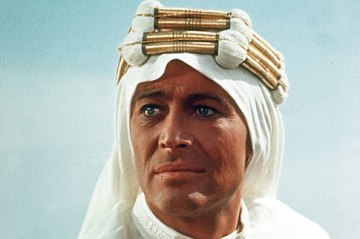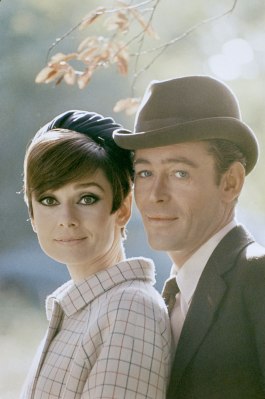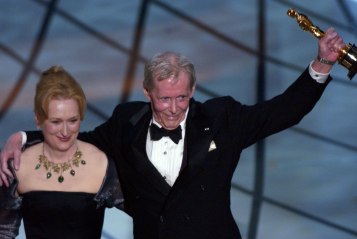O'Toole on the set of the film 'Svengali' in February of 1982
Some film artists are remembered for, and never allowed to forget, their first big movie. Orson Welles, having made Citizen Kane at 25 in 1941, felt trapped by its achievement and notoriety; the rest of his protean career was seen as a frustrating descent from that cinematic peak. Marlon Brando changed the craft of acting when he played Stanley Kowalski in A Streetcar Named Desire on Broadway in 1949 and in the 1951 movie. Like Welles, Brando grew enormous as his persona and performances shrank into repetition and excess. On the deaths of both men we were reminded that early greatness can be less a gift than a curse.
Peter O’Toole must have suspected, from the time director David Lean cast him as the British adventurer T.E. Lawrence, that his obituary headline was destined to read: “Star of Lawrence of Arabia Dies.” So it was when O’Toole, 81, passed away in a London hospital on Dec. 14, “following a long illness” — and a longer decline from his golden 1960s, during which he played the same French king, Henry II, in Becket with Richard Burton and The Lion in Winter with Katharine Hepburn, and capped the decade as a beloved schoolteacher in the musical of Goodbye, Mr. Chips.
(READ: TIME’s original review of Lawrence of Arabia by subscribing to TIME)
He earned Oscar nominations for all four roles, and four more from the ’70s to the 2000s, without ever being named Best Actor. In 2003, when the motion-picture Academy offered him a life-achievement Award in 2003, he initially turned it down, saying he was “still in the game” for a competitive Oscar; he kept on believing that he could find a film to erase the memory of his star-making role. And as he stepped on stage, the orchestra struck up Maurice Jarre’s theme from Lawrence of Arabia.
Say this for the Irishman with the electric blue eyes and gaunt swagger: he had begun at such a height that the rest of his career was almost bound to be anticlimactic — a half-century schuss from the top of Everest. The trip was exciting, the view splendid. Even the spills were fun.
(SEE: Eight roles that didn’t win Peter O’Toole an Oscar)
Peter Seamus O’Toole was born in either Connemara, Ireland, or Leeds, England — he said he had two birth certificates, one from each country — and in either June or August 1932, to an Irish bookmaker and a Scottish nurse. After national service and a stint as a journalist, he tried acting. Rejected by Dublin’s Abbey Theatre because he could not speak Gaelic, he became a scholarship student at the Royal Academy of Dramatic Art, where his classmates included Albert Finney and Alan Bates, who would prove themselves prime exemplars of the naturalistic, “kitchen-sink” style of acting that never suited O’Toole.
Unlike Finney and against Brando, O’Toole represented a throwback to the grand-actor tradition embodied by Laurence Olivier and John Gielgud. (The year after Lawrence, he played Hamlet in a production that Olivier directed but was never filmed or taped.) O’Toole’s smoldering mien and crisp enunciation, easily audible from the top balcony, spoke of theater, not movies. He was not the common man; he was other, above and outside — a higher rank, a different species. He imposed large gestures on his gangly frame, favoring the flailing of elbows over a Method man’s shrug; and these mannerisms lent an almost comic poignancy to his tragic roles. Either way, to the plebeian school of performance, O’Toole was a regal rebuke and an eccentric anachronism.
(SEE: Peter O’Toole’s life in pictures)
Before Lawrence, though, he was just a young actor looking for parts. He found one on stage at the Royal Court Theatre in Willis Hall’s World War II play The Long and the Short and the Tall, another in the 1960 film The Day They Robbed the Bank of England. It happens that Hepburn saw O’Toole in the play and recommended him to Lean, in the throes of casting the title role in his next film. Finney, the original choice, had quit after four days, refusing to sign a multiyear contract with producer Sam Spiegel. Brando, courted for Lawrence, turned it down to spend a year in Tahiti on Mutiny on the Bounty. Burton, whom Lean said “would have been marvelous,” had his hands full with Cleopatra and Elizabeth Taylor. Anthony Perkins, pre-Psycho, was considered for the role, and Montgomery Clift begged to play it.
To help sell a $12 million epic about the British soldier who had led a gaggle of warring Arabs across the Sahara to the port of Aqaba in their successful revolt against the Ottoman Empire, Spiegel wanted a prominent name. Instead, Lean followed Hepburn’s advice, watched O’Toole’s bank-robbery film, then gave him a screen test. “I’d never heard of him before, of course,” he told Stephen M. Silverman in his excellent 1989 biography, David Lean, “but there was something about him. I said, ‘Fine, I’ll go for that’” — as if the decision were no more important than the choice of a distant relative’s birthday gift. Spiegel agreed, and Lawrence had its Lawrence.
(READ: Corliss on the 1989 restoration of Lawrence of Arabia)
At 6-feet–2-inches, O’Toole was about nine inches taller than T.E. Lawrence; the actor’s height proclaimed his subject’s immense stature. In this pensive, swashbuckling incarnation, Lawrence makes for a curious messiah. With his skin like a mandarin orange dipped in sand, his voice intimate and cryptic, his haunted eyes staring from inside his burnoose, O’Toole is a movie dream of the mad Englishman out in the Mideast midday sun. As Noël Coward told him, “If you’d been any prettier, it would have been Florence of Arabia.”
Robert Bolt’s epigrammatic script traced Lawrence’s career from mapmaking in the British army’s Cairo headquarters to masterminding Arab nationalism. And O’Toole created a towering, swashbuckling sheik of Araby, both tragic and high-camp. He whispers his aphorisms as if inventing lines from the Bible, Shakespeare or The Arabian Nights, as translated in the 19th-century by the other Richard Burton. “The desert,” O’Toole’s Lawrence says, “is an ocean in which no oar is dipped.” When he finally treads in the surf of Aqaba, he can celebrate more than a military victory; he is primed to savor a mirage come true. The sand is now water, and this miracle man can walk on both.
(READ: How Lawrence of Arabia presaged the Iraq occupation)
If the movie had ended after the Arab tribes’ victorious siege of Aqaba, Lawrence would be a conventional heroic saga. But Bolt and Lean have a historical tragedy to tell, as political wrangling and tribal massacres fill the screen. Lawrence becomes more extreme, intoxicated by the victory and his sudden worldwide celebrity; he may be the epic genre’s first moody hero, father to countless sacred screen madmen. The British and French blithely divvy up the land, and Omar Sharif’s Sherif Ali is revealed as the one untainted player. That left Lawrence as the last colonial God-man, a crafty idealist doomed by the larger schemes of Imperial Britain, which makes the film a prescient harbinger of U.S. bungles in Iran and Iraq.
In 1962 Lawrence was the ultimate epic — cinema at the apex of its ambition and intelligence. Lavish in visual beauty, the film also boasts economy of style: it knows how much can be shown in a shot, how much can be said in a few words. Honored in its day, it has grown in luster since, influencing filmmakers from Martin Scorsese to Steven Spielberg. “The day before I saw it,” said Spielberg, who was 15 at the time, “I thought I wanted to be a surgeon. The day after, I knew I wanted to be a director. Whenever I want to see what great films used to be like, I watch Lawrence.”
(FIND: Which is the better Best Picture: The Godfather or Lawrence of Arabia?)
Filmed over 15 months in Jordan, Morocco, Spain and England, with territorial difficulties and outbreaks of illness among the cast and crew, Lawrence of Arabia opened on Dec. 10, 1962. It won 10 Academy Awards, including Best Picture, Director, Adapted Screenplay and Supporting Actor (Sharif) — but none for O’Toole, passed over in favor of Gregory Peck in To Kill a Mockingbird. What Lawrence did get the actor was instant fame, which gave him first dibs on major roles in prestige picture with top stars.
(READ: TIME’s review of The Lion in Winter)
He fulminated thoughtfully opposite the ascetic Burton in Becket, spumed and sparred with Hepburn (23 years his senior) as his wife in The Lion in Winter. The other Hepburn, ravishing Audrey, was his partner in William Wyler’s caper comedy How to Steal a Million (below). Could O’Toole carry a tune? Hardly; yet he became the singing professor in Goodbye, Mr. Chips, with a script by Terence Rattigan, whom O’Toole deemed the century’s greatest playwright. Was he suited for film farce? Not exactly; yet he volunteered to star in that elephantine jape, What’s New Pussycat, where he was the center of calm apprehension as Peter Sellers and Woody Allen (his first movie script) cavorted around him. So busy was O’Toole in his post-Lawrence eminence that he turned down the lead in Lean’s next film, Doctor Zhivago. That part went to Sharif.
By the end of the decade, O’Toole was either playing characters just this side of madness, as in The Man of La Mancha (another singing role) and The Ruling Class — his fifth Academy nomination — or imparting his own daft interpretations to more conventional roles. Vodka stoked some of these excesses; that and smoking also led to operations for stomach cancer in the ’70s. Moderating the alcohol intake but not the cigarettes, O’Toole said, “My idea of Heaven is moving from one smoke-filled room to another.” And while a performers of the next generation might spend more time with their physical trainer than with their acting coach, O’Toole adjured any fitness regimen. “The only exercise I take,” he said, “is walking behind the coffins of friends who took exercise.”
Does O’Toole’s love of liquor explain his blithe appearances in awful movies, such as Otto Preminger’s Rosebud and that monumental travesty, Caligula? Produced by Penthouse publisher Bob Guccione, originally scripted by Gore Vidal, and intended as the first high-class film with hard-core sex scenes, Caligula assembled a cast of game British thesps, including Malcolm McDowell, Helen Mirren and the stately Gielgud, whose participation flabbergasted O’Toole. “What is a knight of the realm doing in a porno movie?” he asked McDowell. He might have asked, What was Peter O’Toole doing there? (A few years later, he too was offered a knighthood but rejected it in protest of Margaret Thatcher‘s policies.)
(READ: The pornucopia of Caligula)
Still in his forties, O’Toole has become a modern John Barrymore, the dashing classical actor whom alcohol had driven to unreliability and self-parody. So that’s how Hollywood cast him: as the crazed director in The Stunt Man and the sodden star scheduled for a guest spot on a TV show in My Favorite Year — his sixth and seventh Oscar nominations. Perhaps O’Toole was just acting intoxicated; but in his 1986 London stage role as Henry Higgins in Shaw’s Pygmalion (repeated on Broadway a year later), he tilted aft and fro, as if in clown shoes, and slurred or dropped his lines. He was a Higgins in need of elocution lessons.
Incapable of playing little men bereft of ambition, O’Toole grabbed whatever oversize role came along: Zaltar in Supergirl, the Emperor Pu Yi’s tutor in The Last Emperor, the Emperor of Lilliput in Gulliver’s Travels, Priam in Troy, the King in Stardust, Pope Paul III in The Tudors. The great actor occasionally triumphed over the hammery; and even that could be splendid in measured doses. And in one of his few “small” roles, as the elderly actor in love with a teenager in the 2006 Venus, he poured his old gifts into a tiny, delicate vial — and registered his eighth and final Oscar nomination. By now O’Toole didn’t have to stare into his soul to find the melancholy decay of aging; he could look in the mirror.
(READ: Richard Schickel on Peter O’Toole in Venus)
Backstage at the 2003 ceremony for his forever Oscar, the honoree threatened to bolt unless he was given some hard liquor. Following an introduction by Meryl Streep that lasted longer than his two-minute speech, O’Toole pronounced himself grateful for having been “spared uncertainties prior to the opening of an envelope.” This one was his, for keeps. “I have my very own Oscar to be with me, till death us do part.” Death came 10 years and nine months later.
The wonder is how much O’Toole coveted that award. He might have been a supreme stage actor, and his talent was essentially, proudly theatrical. Yet he pursued the movie muse, enriching cinema much more than he embarrassed it. And even if he had left films 50 years ago, he still have etched on film a performance that many Academy Award winners could not dream of touching. O’Toole of Ireland is our Lawrence of Always.




